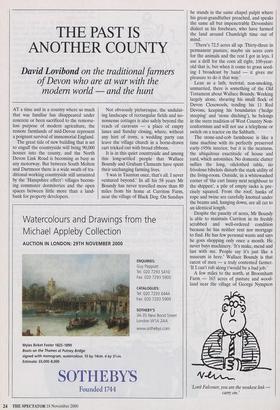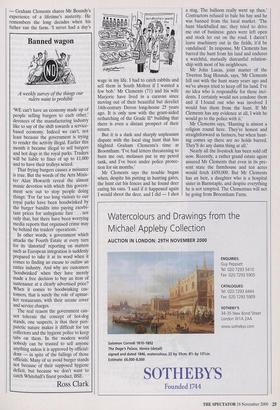THE PAST IS ANOTHER COUNTY
David Lovibond on the traditional farmers
of Devon who are at war with the modem world — and the hunt
AT a time and in a country where so much that was familiar has disappeared under concrete or been sacrificed to the remorse- less purpose of modern agriculture, the remote farmlands of mid-Devon represent a poignant survival of immemorial England.
The great tide of new building that is set to engulf the countryside will bring 90,000 houses into the county, and the North Devon Link Road is becoming as busy as any motorway. But between South Molton and Dartmoor there is a wide swath of tra- ditional working countryside still untainted by the 'Hampshire effect': villages becom- ing commuter dormitories and the open spaces between little more than a land- bank for property developers. Not obviously picturesque, the undulat- ing landscape of rectangular fields and no- nonsense cottages is also safely beyond the reach of caravans — a place of empty lanes and Sunday closing, where, without any hint of irony, a wedding party can leave the village church in a horse-drawn cart tricked out with broad ribbons.
It is in this quiet countryside and among this long-settled people that Wallace Boundy and Graham Clements have spent their unchanging farming lives.
`I was in Taunton once, that's all. I never ventured beyond.' In all his 58 years Mr Boundy has never travelled more than 80 miles from his home at Curriton Farm, near the village of Black Dog. On Sundays
he stands in the same chapel pulpit where his great-grandfather preached, and speaks the same all but impenetrable Devonshire dialect as his forebears, who have farmed the land around Chumleigh time out of mind.
`There's 72.5 acres all up. Thirty-three in permanent pasture, maybe six acres corn for the animals and the rest I got in leys. I use a drill for the corn all right, 100-year- old that is, but when it come to grass seed- ing I broadcast by hand — it gives me pleasure to do it that way.'
Lean as a lath, teetotal, non-smoking, unmarried, there is something of the Old Testament about Wallace Boundy. Working largely alone, shearing his small flock of Devon Closewools, tending his 11 Red Devons, keeping his boundaries (`hedge steeping' and 'stone ditching'), he belongs in the stern tradition of West Country Non- conformism and will not use a telephone or switch on a tractor on the Sabbath.
The stone-and-cob farmhouse is like a time machine with its perfectly preserved early-1950s interior, but it is the neatness, the ubiquitous exactitude of house and yard, which astonishes. No domestic clutter sullies the long, oilclothed table, no frivolous bibelots disturb the stark utility of the living-room. Outside, in a whitewashed corner of 'the cart linney next neighbour to the shipped, a pile of empty sacks is pre- cisely squared. From the roof, hanks of rope and twine are carefully knotted under the beams and, hanging down, are all cut to an identical length.
Despite the paucity of acres, Mr Boundy is able to maintain Curriton in its freshly scrubbed and well-ordered condition because he has neither rent nor mortgage to find. He has few personal wants and says he goes shopping only once a month. He never buys machinery. 'It's make, mend and last with me. People say it's just like a museum in here.' Wallace Boundy is that rarest of men — a truly contented farmer. `If I can't rub along t'would be a bad job.'
A few miles to the north, at Broomham Farm — 165 acres of pasture and wood- land near the village of George Nympton
`Lord Falconer, you are the weakest link - carry on.' — Graham Clements shares Mr Boundy's experience of a lifetime's austerity. He remembers the long decades when his father ran the farm. 'I never had a day's wage in my life. I had to catch rabbits and sell them in South Molton if I wanted a few bob.' Mr Clements (71) and his wife Marjorie have lived in a caravan since moving out of their beautiful but derelict 14th-century Devon long-house 25 years ago. It is only now with the grant-aided rethatching of the Grade 11* building that there is even a distant prospect of their return.
But it is a dark and sharply unpleasant dispute with the local stag hunt that has blighted Graham Clements's time at Broomham. 'I've had letters threatening to burn me out, molasses put in my petrol tank, and I've been under police protec- tion for six months.'
Mr Clements says the trouble began when, despite his putting in hunting gates, the hunt cut his fences and he found deer eating his oats. 'I said if it happened again I would shoot the deer, and I did — I shot a stag. The balloon really went up then.' Contractors refused to bale his hay and he was banned from the local market. The hunt blackballed me; they tried to drive me out of business: gates were left open and stock let out on the road. I daren't leave machinery out in the fields, it'd be vandalised.' In response, Mr Clements has barred the hunt from his land and endures a watchful, mutually distrustful relation- ship with most of his neighbours.
Mr John Lucas, joint master of the Tiverton Stag Hounds, says, 'Mr Clements fell out with the hunt many years ago and we've always tried to keep off his land. I've no idea who is responsible for these inci- dents. I certainly would not condone them and if I found out who was involved I would ban them from the hunt. If Mr Clements has any evidence at all, I wish he would go to the police with it.'
Mr Clements says, 'Hunting is almost a religion round here. They're honest and straightforward as farmers, but when hunt- ing comes up there are no holds barred. They'll do any damn thing at all.'
Nearly all the livestock has been sold off now. Recently, a rather grand estate agent assured Mr Clements that even in its pre- sent state the farmhouse and ten acres would fetch £450,000. But Mr Clements has an heir, a daughter who is a hospital sister in Barnstaple, and despite everything he is not tempted. The Clementses will not be going from Broomham Farm.



































































































 Previous page
Previous page